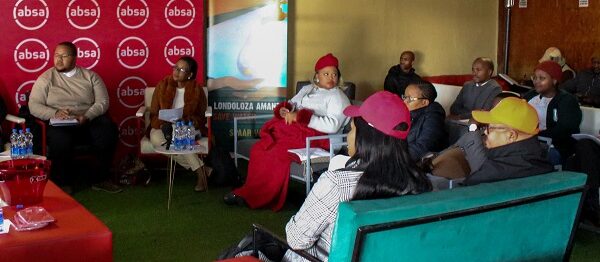By Fahdia Msaka
Members of the Makana small and medium enterprises (SME) community, representatives of banks, Sarah Baartman District Municipality, and Rhodes University gathered at the Jazz Corner in Joza on 20 June to discuss how to enable township entrepreneurs to access opportunities in the digital economy.
The ‘Kasi Talks Business’ event was sponsored by Absa, with successful entrepreneurs Siyabulelo Mandla, Rhino Group managing director, and Khaya Tantsi, director of Khula Tech Solutions, sharing their experiences of starting an SME in the township. Mandla said when he was studying, his research proposal on the Township Economy was rejected by his supervisors, who argued that such a thing did not exist.
There are 533 townships in South Africa, with Gauteng townships housing the biggest population. 50% of the population in South Africa lives in townships, while 70% of working-class people in townships are unemployed. These alarming numbers bring attention to the seriousness of this conversation about building the township economy and underscore the importance of holding these talks in townships.
According to Mandla, the township businesses that generate the most income for their owners include those in the production and selling of traditional medicines, salons that focus on braiding hair and selling wigs, the taxi industry, and fast food outlets. Mandla pointed out that these are the businesses most commonly found in townships, but that people tend to undermine them and overlook the value that they can bring to the township economy.
Another speaker at the event, Rhodes University Television lecturer Thandeka Gqubule-Mbeki, “one of the reasons South Africans don’t progress in townships is because they do not formalize their businesses. So they miss out on the benefits that they can receive as startup businesses from banks,” she said.
Historically in South Africa, Black citizens were barred by the apartheid regime from owning businesses, and Gqubule-Mbeki suggested that Black South Africans do not have a culture of teaching business in their homes due to the deep-rooted fear, caused by apartheid laws, of owning a business. She proposed that all businesses in Makhanda meet up for conversations about rejuvenating the township economy irrespective of their race and social class, for the sake of a better economic South Africa. This conversation would need leaders, and it would need investment to be directed to micro-enterprises such as the person on the street corner fixing shoes, she said.
ANC Councillor in Makana Municipality, Mzobanzi Nkwentsha, said 80% of South Africa’s wealth emanates from the agricultural industry, yet the youth seems to show a lack of interest in the agricultural sector. In fact, not many youth even showed up to this Kasi Talks Business event, even though it was intentionally held in a venue that the youth frequent regularly.
The Kasi Talks Business programme is also meant to create an inclusive dialogue between financiers, SME owners, and would-be entrepreneurs, instead of the standard top-to-bottom conversation that usually occurs in business spaces. The speakers said they intended to go across the country to initiate this conversation for the sake of the progress of the township economy.


